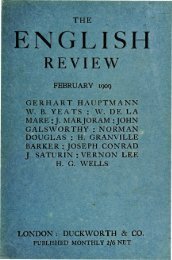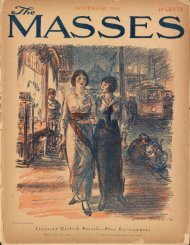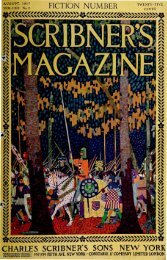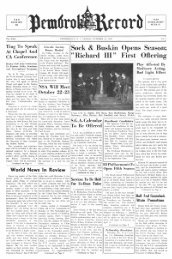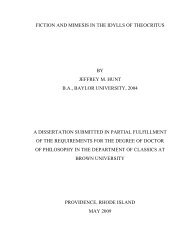View PDF - Brown Library
View PDF - Brown Library
View PDF - Brown Library
Create successful ePaper yourself
Turn your PDF publications into a flip-book with our unique Google optimized e-Paper software.
236 The Bounty-Jumper<br />
had held within its walls, loomed gray<br />
above the flowering shrubs, a saddening<br />
reminder of days that James Thorold must<br />
have known; but Thorold, glimpsing the<br />
place, turned away from it in a movement<br />
so swift as to betoken some resentment<br />
and gave heed instead to the long line of<br />
motors rolling smoothly toward the city's<br />
heart.<br />
Over the bridge and through the packed<br />
streets of the down-town district Thorold,<br />
shaken from his revery of power and<br />
Peter, watched the film that Chicago unrolled<br />
for the boulevard pilgrims. The<br />
boats in the river, the long switch-tracks<br />
of the railroads, the tall grain-elevators,<br />
the low warehouses from which drifted alluring<br />
odors of spices linked for James<br />
Thorold the older city of his youth with<br />
the newer one of his age as the street<br />
linked one division of the city's geography<br />
with another. They were the means by<br />
which Chicago had risen from the sandflats<br />
of the fifties to the Michigan Avenue<br />
of the present, that wide street of the high<br />
sky-line that fronted the world as it faced<br />
the Great Lakes, squarely, solidly, openly.<br />
They were the means, too, by which<br />
James Thorold had augmented his fortune<br />
until it had acquired the power to<br />
send him to Forsland. To him, however,<br />
they represented not ladders to prosperity<br />
but a social condition of a passing generation,<br />
the Chicago of the seventies, a city<br />
distinctively American in population and<br />
in ideals, a youthful city of a single standard<br />
of endeavor, a pleasant place that had<br />
been swallowed by the Chicago of the<br />
present, that many-tentacled monster of<br />
heterogeneous races, that affected him,<br />
as it did so many of the older residents,<br />
with an overwhelming sensation of revolt<br />
against its sprawling lack of cohesion.<br />
Even the material advantages that had<br />
accrued to him from the growth of the<br />
city could not reconcile James Thorold to<br />
the fact that the elements of the city's<br />
growth came from the races of men whom<br />
he held in contempt. What mattered it,<br />
he reasoned, that Chicago waxed huge<br />
when her grossness came from the unassimilated,<br />
indigestible mass of Latins and<br />
Greeks, Poles and Russians, Czechs, Bulgars,<br />
Jews, who filled the streets, the factories,<br />
and the schools?<br />
The prejudice, always strong within<br />
him, rose higher as he found his machine<br />
blocked again, this time by the crowd that<br />
stood across Jackson Boulevard at La<br />
Salle Street. Even after the peremptory<br />
order of a mounted police officer had<br />
cleared the way for him James Thorold<br />
frowned on the lines of men and women<br />
pressed back against the curbstones. The<br />
thought that they were waiting the coming<br />
of the body of that boy who had died<br />
in Mexico added to his annoyance the realization<br />
that he would have to fight his<br />
way through another crowd at the station<br />
if he wished to reach the train-shed where<br />
Peter's train would come. The struggle<br />
was spared him, however, by the recognition<br />
of a newspaper reporter who took<br />
it for granted that the ambassador to Forsland<br />
had come to meet the funeral cortege<br />
of the marine and who led him through a<br />
labyrinthine passage that brought him<br />
past the gates and under the glass dome<br />
of the train-shed.<br />
Left alone, Thorold paced the platform<br />
a little apart from the group of men<br />
who had evidently been delegated to represent<br />
the city. Some of them he knew.<br />
Others of them, men of Isador Framberg's<br />
people and of the ten tribes of Israel,<br />
he did not care to know. He turned<br />
away from them to watch the people beyond<br />
the gates. Thousands of faces, typical<br />
of every nation of Europe and some of<br />
the lands of Asia, fair Norsemen and Teutons,<br />
olive-skinned Italians and men and<br />
women of the swarthier peoples of Palestine,<br />
Poles, Finns, Lithuanians, Russians,<br />
Bulgars, Bohemians, units of that<br />
mass which had welded in the city of the<br />
Great Lakes of America, looked out from<br />
behind the iron fence. The tensity written<br />
on their faces, eager yet awed, brought<br />
back to James Thorold another time when<br />
men and women had stood within a Chicago<br />
railway terminal waiting for a funeral<br />
cortege, the time when Illinois waited in<br />
sorrow to take Abraham Lincoln, dead, to<br />
her heart. The memory of that other<br />
April day of dirges linked itself suddenly<br />
in the mind of James Thorold with the<br />
picture of the lilacs blooming in the yard<br />
of the Adams homestead on the Parkway,<br />
that old house where Abraham Lincoln had<br />
been wont to come; and the fusing recollections<br />
spun the ambassador to Forsland<br />
upon his heel and sent him far down the



